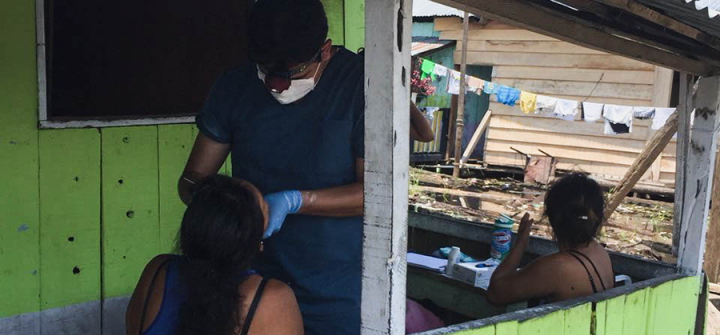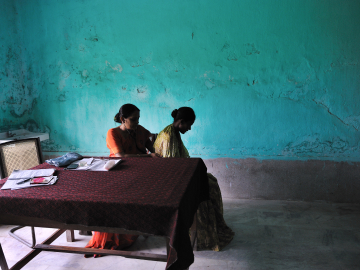Claverito: Oral Health in the Peruvian Amazon
Afloat on the Amazon River drifts the impoverished slum of Claverito, made up of 50 homes filled with over 280 migrants. Neglected by the Peruvian government, Claverito residents start their daily challenges with a water source polluted with sewage and garbage—the same water that quenches their thirst.
Over half of the world’s population live in urban areas and about 1 billion people live in informal, under-resourced urban communities. Claverito, Iquitos is one among many communities living in similar unsanitary conditions that damage their systemic health.
To improve the public infrastructure, water sanitation, and diet of its residents, InterACTION Labs—a collaboration of departments at the University of Washington, including global health, landscape architecture, neurology, epidemiology, medicine-infectious diseases, nursing, environment and dentistry—partnered with the Claverito community to design an intervention, beginning by studying the current conditions.
Oral health is a determinant of health that can be studied through the microbiome. In both informal and formal settlements, oral diseases can be indicators of pollutants, malnutrition, and poor hygiene habits. Research has shown that 90% of Peruvians have dental caries, 85% have periodontal diseases, and 80% exhibit malocclusions; these conditions lead to dental pain, odor, impaired function, and poor aesthetics, all of which impact patients’ quality of life. As Claverito utilizes a different water system from other cities in Peru, studying its microbiome is critical for the study of its dental disease.
Addressing oral disease requires more than a single dental appointment—the residents of Claverito need to know that there are government resources available to help them improve their oral health. Next steps include working with the local community for sustainable programs that integrate oral health care within existing Peruvian resources, through a health fair and other efforts.
The effects of this effort, funded by the UW Population Health Initiative grant (2017) and the Universidad Mayor de San Marcos in Peru, will be measured by examining the microbiome of the mouth and GI tract, as well as other traditional health measures. Through this research and outreach, we hope to not only impact the environment and improve the health of the people who reside in it, but also serve as a project model for other global interventions.
Ana Lucia Seminario DDS, PhD, MPH, obtained her DDS and Pediatric Dentistry certificate from the Peruvian University Cayetano Heredia before earning her PhD in Stomatology from Charles University (Czech Republic) and MPH in Epidemiology from the UW. Currently, she is the director of the UW Timothy A. DeRouen Center for Global Oral Health.
Belle Chen, DDS Candidate, is currently a dental student at the University of Washington and a research assistant to the Oral Health component of InterACTION Labs. Her current research interests are in quality of life research in Peru and connecting refugees with dental care in the Seattle area.
Join the tens of thousands of subscribers who rely on Global Health NOW summaries and exclusive articles for the latest public health news. Sign up for our free weekday enewsletter, and please share the link with friends and colleagues: http://www.globalhealthnow.org/subscribe.html
Marco Alarcon, DDS, MS, conducts an oral examination in Peru's impoverished Claverito settlement. Image courtesy of the DeRouen Center for Global Oral Health, University of Washington




